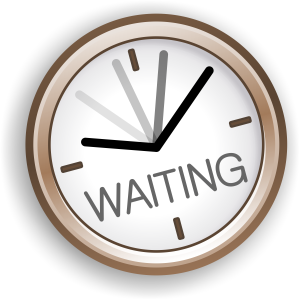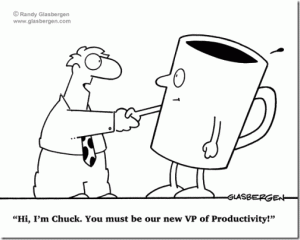 For some time now, I have been in a state of transition for many personal and professional reasons, but right now I’d like to talk about something many of us can relate to:
For some time now, I have been in a state of transition for many personal and professional reasons, but right now I’d like to talk about something many of us can relate to:
depression caused by all the waiting around during the job hunt.
It’s bad enough to wait for potential employers to call back and set up the first steps of the interview process. Waiting for the first call no longer bothers me, though. Now I dread the time after the interview.
As you wait to find out if you have been chosen for the position, time drags by at a snail’s pace. For the first few days after the interview, every time the phone rings, you leap to answer it only to discover it’s just your friend or family member calling. You check your email every 10 minutes, just in case. You torment yourself by replaying the interview in your head again, and again, and again, just to see if you may have said something idiotic or insensitive.
Eventually, someone might be kind enough to end your suffering by sending you some sort of rejection letter. More often than not, though, you hear nothing about the job for close to a week, stress over whether emailing them about the position makes you sound needy, finally email the employer anyway, and then find out that the company has selected someone else or that the position has been put on hold.
Or – if the stars align and the time is right – you might actually get offered the position!
NEVERTHELESS . . . before you get any answers, there is still the matter of what to do while you are waiting for your professional life to move forward.
Sure – you could do nothing and just sit there waiting. After all – you totally nailed the interview, you have a solid resume, and your references can’t say enough good things about you. Why do anything else BUT wait for the good news?
First of all, while there is nothing wrong with overconfidence, it’s easy to let your hubris blind you.
REALITY CHECK: most employers don’t have time to waste, so they only speak to the people with the best credentials, experience, and references. That means that no matter how good you are, chances are you are up against people who are equally as talented.
Of course, knowing the reality of the situation doesn’t make the waiting process any easier. The dark voices of your job hunt-induced depression will make you obsess about all your negative attributes, your insufficient training in one area, or your lack of experience in another.
Waiting makes us down spiral because it’s the place in which we have no control over our destiny.
We can’t make employers read our resumes, and we can’t make interviewers choose us over the others. When you’re waiting, everything is out of your hands, making you feel vulnerable, miserable, and easily agitated.
Luckily – you can fight back against waiting-game depression!
The following recommendations WILL NOT cure you of your depression, but these suggestions will help you keep your energy up, so you can remain vigilant on the job hunt.
Post-Interview R&R
You just had your big interview, and you feel amazing. Granted, you’ve gone through the interview dance before, but don’t let that get you down! Remember that statistically only 1 out of every 100 applicants get interviewed. You deserve a pat on the back just for getting selected, so feel free to celebrate a little. More importantly, give yourself a break.
If you have been on the job hunt for long, you have spent weeks, if not months, meticulously reading through job advertisements, and you have no doubt spent just as much time crafting the perfect cover letter and resume. After finally getting an interview, going back to the grind of the job hunt is the last thing you want to do – so don’t stress yourself out over it.
Give yourself at least one day away from the job hunt. Watch movies, play video games, read a book, leave the house – whatever you want, as long as you give yourself that time to relax as a reward for your hard work.
Maintain Productivity
 After some well-deserved R&R, you have to get right back into the swing of job hunting. It might be the last thing you want to do, especially while you’re waiting to hear back from an employer, but until you receive an actual offer of employment, the fact is you DON’T have the job.
After some well-deserved R&R, you have to get right back into the swing of job hunting. It might be the last thing you want to do, especially while you’re waiting to hear back from an employer, but until you receive an actual offer of employment, the fact is you DON’T have the job.
Besides, in today’s job market, timing is everything! Consider the following:
- Most employers respond to applicants and set up interview appointments within 3-7 days of the original job advertisement posting.
- The majority of employers take 5-10 business days to choose who they want to hire after the final interviews have taken place. (That means you’re waiting up to two weeks for a decision.)
- If you wait to start sending out job applications until you receive a formal rejection, you will be set back 1-3 weeks on your job hunt.
- If you start job hunting 1 business day after your big interview, you could possibly set up another interview with a different company before you even get the results from your first interview.
To put it more simply, regardless of how many interviews you get, you have to keep moving forward with your plan to get a new job. That means if your goal is to apply to 10 different positions every week, STICK TO YOUR PLAN! Until you get that offer, treat it like business as usual.
Remember that every time you take a break from sending out applications, you set yourself back by days or weeks, which will only make the depression worse. It’s difficult to stay committed, especially while you’re waiting, but if you think about it as something to do WHILE you’re waiting, it may help take the edge off.
Healthy Distractions
Although staying productive is key, there are only so many job applications you can send out. If you are currently working while job hunting, you can use your job as a distraction. If you’re not working, or only working part-time/freelance, you have a lot more time to kill, so you’ll have to determine which healthy distractions work best for you.
Realize that by healthy I don’t necessarily mean things that can improve your health. I mean tasks they keep you mentally healthy and away from the down falls of depression.
If improving your health does distract you, studies have shown that exercise can improve your moods, which can help fight depression and anxiety.
When choosing other distractions, remember to choose activities that will minimize further frustrations. While trying to learn a new skill may improve your resume, the stress of job hunting can make you more irritable than usual. Angry people typically don’t make the best learners, so if you’re too frustrated to focus, you may want to try something else.
Another factor to consider when choosing your distractions includes choosing something that gets you out of your house. It’s easy when you’re job hunting to become reclusive, which only makes you more depressed. Try to get out of the house and visit with friends. Even if you’re low on funds, there are some free and inexpensive activities you can do with other people, such as meeting up to window shop, hanging out in the park, etc.
As an added bonus, by leaving your house on a regular basis, it’s easier to ignore your email inboxes, since you’re keeping yourself busy with other activities. If you check your email by phone, however, it might be harder to keep yourself distracted. Some therapists recommend turning your phone off for at least one hour every day. Let people know when you’re turning your phone off, just in case an emergency happens, though. Many people have reported that turning off their phones makes them feel lighter. Some people even experience a sense of relief when they don’t have to deal with the constant chiming and vibrating of their phones every five seconds.
